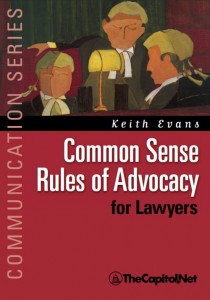Whenever you must give an oral presentation, being aware of a few critical elements can make a significant difference in the impact of your presentation.

First, make certain you know how loudly you must speak in order to be heard. Venues come in all different sizes and shapes. Whenever possible, get an idea ahead of time of what you can expect from the physical layout of the venue so you will know how loudly you need to speak. Ceiling heights can vary quite a bit, and some venues have walls that absorb sound while others do not.
It is also a good idea to practice using your voice within a variety of different spaces. Ask someone to observe and let you know how easily you can be heard. Explore using your voice in a range of softness and loudness.
People tend to respond better to the type of delivery that is informative and conversational. It is essential to know your own audibility in order to deliver an appropriate presentation.
 Also vary our pace as well as your tone. Without this type of variance, your delivery will sound boring. Record yourself and listen to the playback. Even better, video yourself while you are having a simple conversation with someone else. Listen to your delivery with a critical ear. Does it seem as though your pace is too fast? Does it sound too slow? Do you cover a range of both lows and highs? Most people are often somewhat reticent about examining themselves in this manner, and yet it can help you develop a solid understanding of how you deliver oral presentations and where you can make improvements to be more effective.
Also vary our pace as well as your tone. Without this type of variance, your delivery will sound boring. Record yourself and listen to the playback. Even better, video yourself while you are having a simple conversation with someone else. Listen to your delivery with a critical ear. Does it seem as though your pace is too fast? Does it sound too slow? Do you cover a range of both lows and highs? Most people are often somewhat reticent about examining themselves in this manner, and yet it can help you develop a solid understanding of how you deliver oral presentations and where you can make improvements to be more effective.
There is certainly no reason to be bashful about examining yourself in this regard. You can be certain that others will be examining you throughout your presentation, and you do not want to be the last person to know if you have some habit that could be easily corrected.
Finally, be aware of timing. Take advantage of the opportunity and the power of the pause. Timing is essential to any outstanding oral presentation, whether you are acting on stage, delivering a closing argument in a courtroom, or testifying before Congress. Many inexperienced speakers often feel the need to maintain continuity and to continue speaking in order to avoid lapses. A well timed pause can be all it takes to create impact.
Reference: Common Sense Rules of Advocacy, by Keith Evans, Rule 30–Know Your Audibility, Rule 31–Vary Your Pace and Vary Your Tone, Rule 32–Be Aware of Timing and Use the Power of the Pause
For more than 40 years, TheCapitol.Net and its predecessor, Congressional Quarterly Executive Conferences, have been teaching professionals from government, military, business, and NGOs about the dynamics and operations of the legislative and executive branches and how to work with them.
Our custom on-site and online training, publications, and audio courses include congressional operations, legislative and budget process, communication and advocacy, media and public relations, testifying before Congress, research skills, legislative drafting, critical thinking and writing, and more.
TheCapitol.Net is on the GSA Schedule, MAS, for custom on-site and online training. GSA Contract GS02F0192X
TheCapitol.Net is now owned by the Sunwater Institute.
Teaching how Washington and Congress work ™

